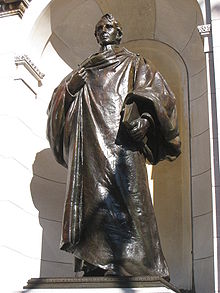Frugality
Frugality (also known as thrift or thriftiness) is the practice of minimizing waste. Frugality can be related to the idea of being conservative or conserving money.



Quotes
edit- Anyone whose needs are small seems threatening to the rich, because he’s always ready to escape their control.
- Nicolas Chamfort, Reflections, D. Parmée, trans. (London: 2003) #169
- A true cultivation of the mind is fitted to forward you in your worldly concerns, and you ought to use it for this end. Only, beware lest this end master you; lest your motives sink as your condition improves; lest you fall victims to the miserable passion of vying with those around you in show, luxury, and expense. Cherish a true respect for yourselves. Feel that your nature is worth more than every thing which is foreign to you.
- William Ellery Channing, “Self-Culture” (1838)
- Economy, in the estimation of common minds, often means the absence of all taste and comfort.
- Lady Saba Holland, A Memoir of the Reverend Sydney Smith (London: Longman, Brown, Green, and Longmans, 1855), Vol. I, ch. 8, p. 263
- Often misattributed to Lady Holland's father, Sydney Smith.
- Since those who rule in the city do so because they own a lot, I suppose they're unwilling to enact laws to prevent young people who've had no discipline from spending and wasting their wealth, so that by making loans to them, secured by the young people's property, and then calling those loans in, they themselves become even richer and more honored.
- Plato, The Republic, 555c, G. Grube and C. Reeve, trans., Plato: Complete Works (1997), p. 1166.
- I worship freedom; I abhor restraint, trouble, dependence. As long as the money in my purse lasts, it assures my independence; it relieves me of the trouble of finding expedients to replenish it, a necessity which has always inspired me with dread; but the fear of seeing it exhausted makes me hoard it carefully. The money which a man possesses is the instrument of freedom; that which we eagerly pursue is the instrument of slavery. Therefore I hold fast to that which I have, and desire nothing.
- Jean-Jacques Rousseau, Confessions (Wordsworth: 1996), p. 35
- People who originally have no means but are ultimately able to earn a great deal, through whatever talents they may possess, almost always come to think that these are permanent capital and that what they gain through them is interest. Accordingly, they do not put aside part of their earnings to form a permanent capital, but spend their money as fast as they earn it. But they are then often reduced to poverty because their earnings decrease or come to an end after their talent, which was of a transitory nature, is exhausted, as happens, for example, in the case of almost all the fine arts; or because it could be brought to bear only under a particular set of circumstances that has ceased to exist.
- Schopenhauer, “Aphorisms on the Wisdom of Life,” Parerga und Paralipomena, E. Payne, trans. (1974) Vol. 1, p. 348
- But as they all say if we sell our home what will we have for it, money, and what is the use of that money, money goes and after it is gone then where are we, beside we have all we want, what can we do with money except lose it, money to spend is not very welcome, if you have it and you try to spend it, well spending money is an anxiety, saving money is a comfort and a pleasure, economy is not a duty it is a comfort, avarice is an excitement, but spending money is nothing, money spent is money non-existent, money saved is money realised...
- Gertrude Stein. Paris France. New York: Liveright, 1970. (p. 103)
- Many people pay lip service to the ideals of frugality and simplicity, but you still don't see many politicians trying to get elected on a platform of policies shaped by the principle that the good life is the simple life. On the contrary, politicians promise and governments strive to raise their society's levels of production and consumption. The value of continual economic growth is a given. The majority of individuals everywhere...seem to associate happiness more with extravagance than with frugality.
- Emrys Westacott, The Wisdom of Frugality: Why Less Is More - More or Less (2016), p. 3
See also
editExternal links
editVirtues
Altruism • Asceticism • Beneficence • Benevolence • Bravery • Carefulness • Charity • Cheerfulness • Cleanliness • Common sense • Compassion • Constancy • Courage • Dignity • Diligence • Discretion • Earnestness • Faith • Fidelity • Forethought • Forgiveness • Friendship • Frugality • Gentleness • Goodness • Grace • Gratitude • Holiness • Honesty • Honor • Hope • Hospitality • Humanity • Humility • Integrity • Intelligence • Justice • Kindness • Love • Loyalty • Mercy • Moderation • Modesty • Optimism • Patience • Philanthropy • Piety • Prudence • Punctuality • Poverty • Purity • Self-control • Simplicity • Sincerity • Sobriety • Sympathy • Temperance • Tolerance
Vices
Aggression • Anger • Apathy • Arrogance • Bigotry • Contempt • Cowardice • Cruelty • Dishonesty • Drunkenness • Egotism • Envy • Evil speaking • Gluttony • Greed • Hatred • Hypocrisy • Idleness • Ignorance • Impatience • Impenitence • Ingratitude • Inhumanity • Intemperance • Jealousy • Laziness • Lust • Malice • Neglect • Obstinacy • Philistinism • Prejudice • Pretension • Pride • Recklessness • Self-righteousness • Selfishness • Superficiality • Tryphé • Unkindness • Usury • Vanity • Worldliness